人教版2019年高中必修二 Unit 4 History and Traditions 单元知识总结清单(含练习题和书面表达句式和范文)
文档属性
| 名称 | 人教版2019年高中必修二 Unit 4 History and Traditions 单元知识总结清单(含练习题和书面表达句式和范文) |
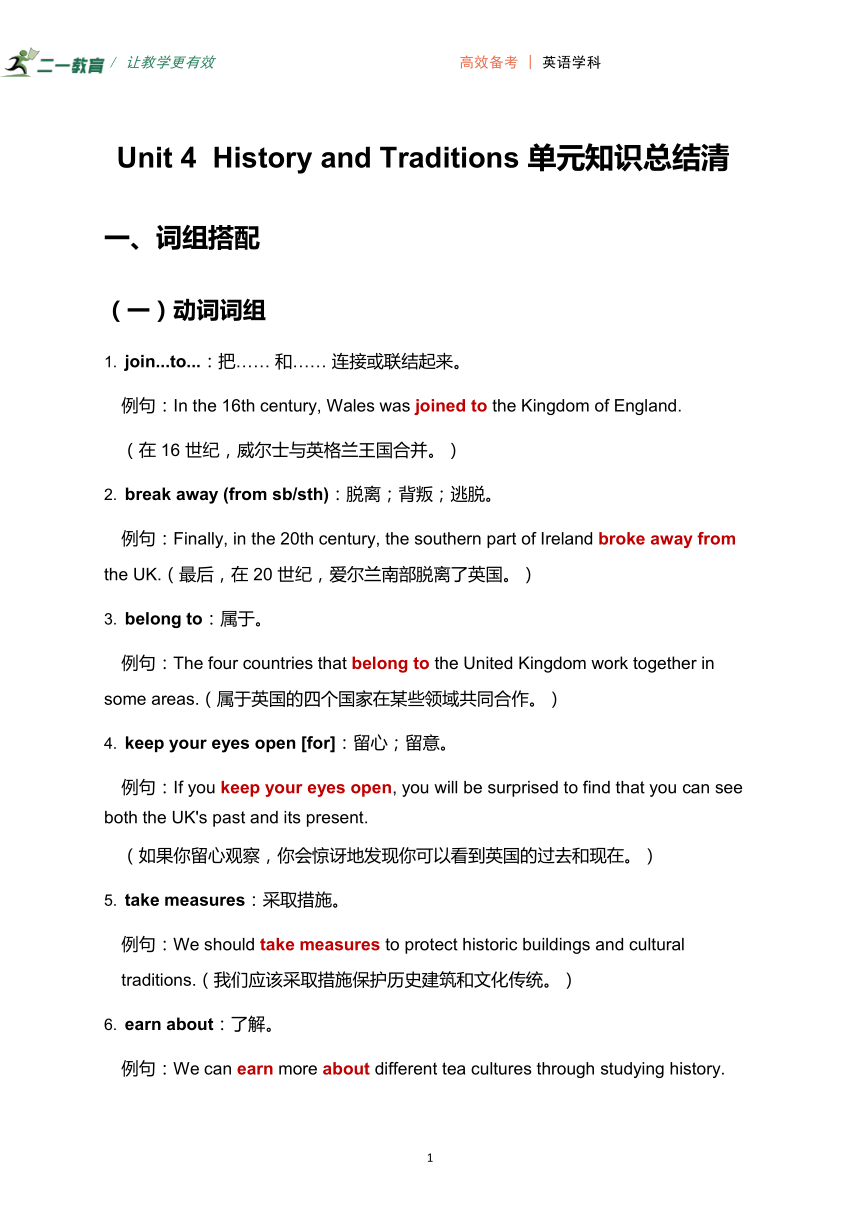
|
|
| 格式 | docx | ||
| 文件大小 | 43.2KB | ||
| 资源类型 | 试卷 | ||
| 版本资源 | 人教版(2019) | ||
| 科目 | 英语 | ||
| 更新时间 | 2025-07-13 00:00:00 | ||
图片预览

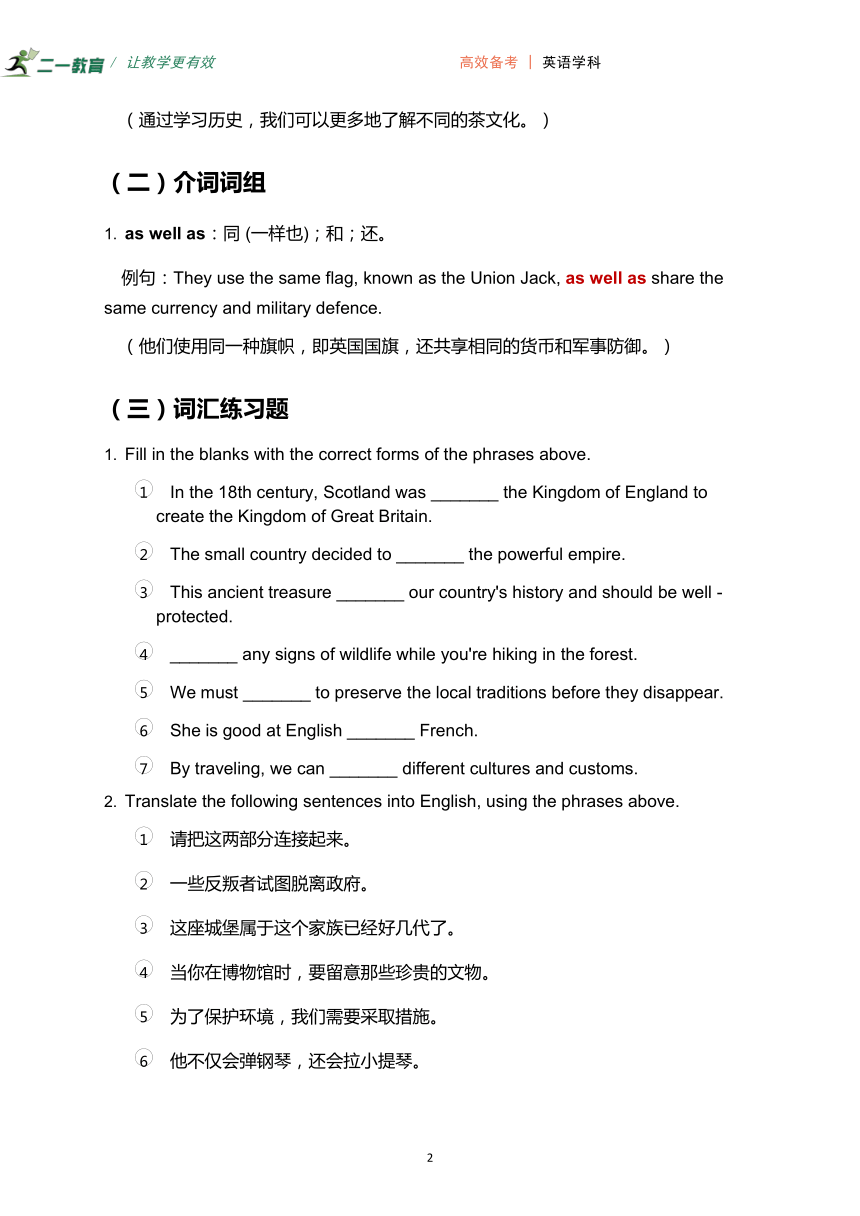
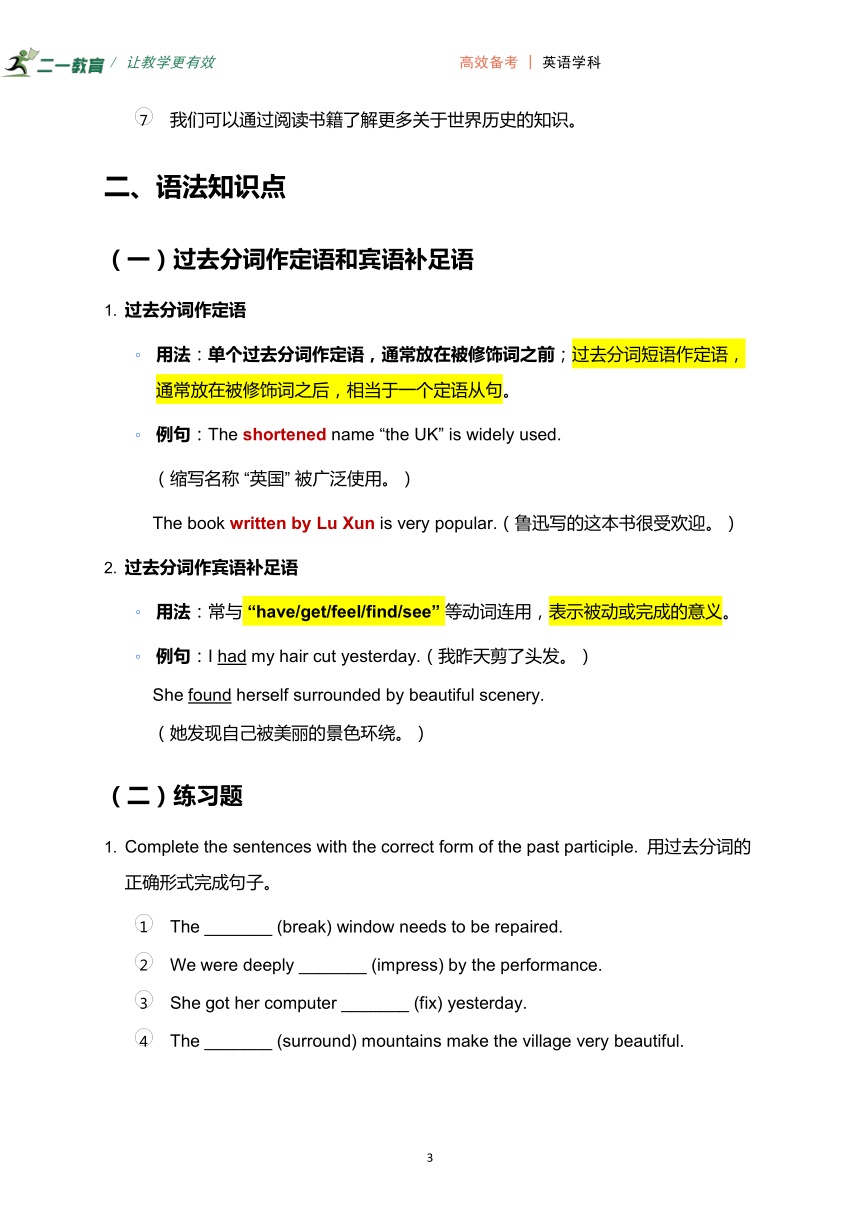
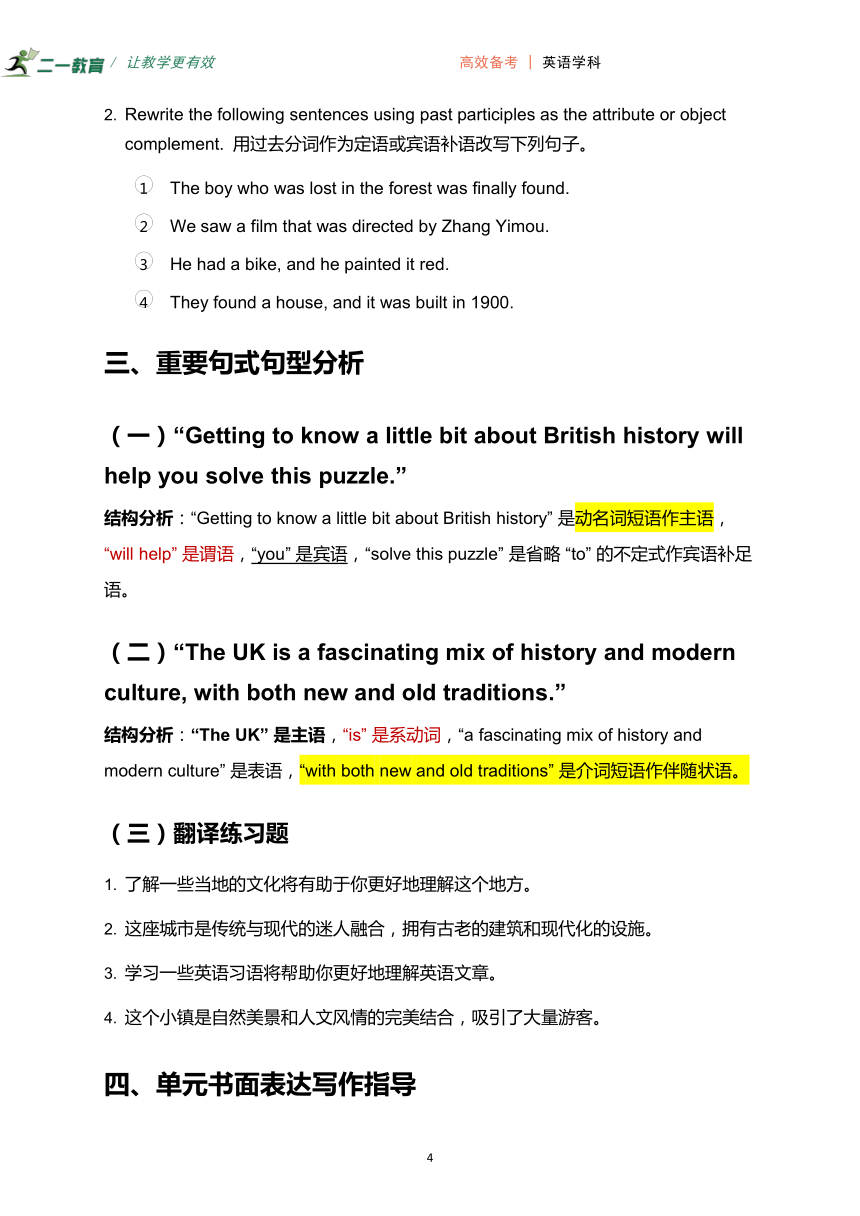
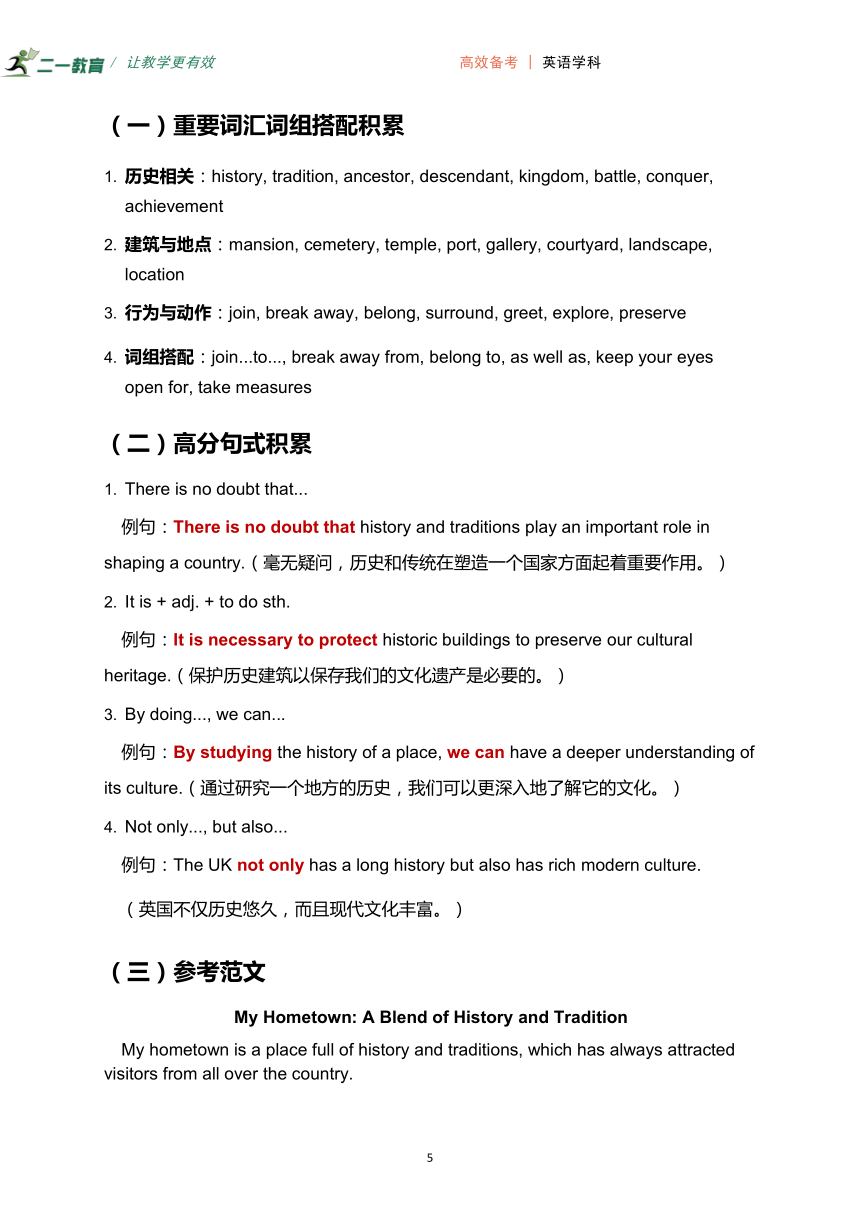
文档简介
/ 让教学更有效 高效备考 | 英语学科
Unit 4 History and Traditions 单元知识总结清
一、词组搭配
(一)动词词组
join...to...:把…… 和…… 连接或联结起来。
例句:In the 16th century, Wales was joined to the Kingdom of England.
(在 16 世纪,威尔士与英格兰王国合并。)
break away (from sb/sth):脱离;背叛;逃脱。
例句:Finally, in the 20th century, the southern part of Ireland broke away from the UK.(最后,在 20 世纪,爱尔兰南部脱离了英国。)
belong to:属于。
例句:The four countries that belong to the United Kingdom work together in some areas.(属于英国的四个国家在某些领域共同合作。)
keep your eyes open [for]:留心;留意。
例句:If you keep your eyes open, you will be surprised to find that you can see both the UK's past and its present.
(如果你留心观察,你会惊讶地发现你可以看到英国的过去和现在。)
take measures:采取措施。
例句:We should take measures to protect historic buildings and cultural traditions.(我们应该采取措施保护历史建筑和文化传统。)
earn about:了解。
例句:We can earn more about different tea cultures through studying history.
(通过学习历史,我们可以更多地了解不同的茶文化。)
(二)介词词组
as well as:同 (一样也);和;还。
例句:They use the same flag, known as the Union Jack, as well as share the same currency and military defence.
(他们使用同一种旗帜,即英国国旗,还共享相同的货币和军事防御。)
(三)词汇练习题
Fill in the blanks with the correct forms of the phrases above.
In the 18th century, Scotland was _______ the Kingdom of England to create the Kingdom of Great Britain.
The small country decided to _______ the powerful empire.
This ancient treasure _______ our country's history and should be well - protected.
_______ any signs of wildlife while you're hiking in the forest.
We must _______ to preserve the local traditions before they disappear.
She is good at English _______ French.
By traveling, we can _______ different cultures and customs.
Translate the following sentences into English, using the phrases above.
请把这两部分连接起来。
一些反叛者试图脱离政府。
这座城堡属于这个家族已经好几代了。
当你在博物馆时,要留意那些珍贵的文物。
为了保护环境,我们需要采取措施。
他不仅会弹钢琴,还会拉小提琴。
我们可以通过阅读书籍了解更多关于世界历史的知识。
二、语法知识点
(一)过去分词作定语和宾语补足语
过去分词作定语
用法:单个过去分词作定语,通常放在被修饰词之前;过去分词短语作定语,通常放在被修饰词之后,相当于一个定语从句。
例句:The shortened name “the UK” is widely used.
(缩写名称 “英国” 被广泛使用。)
The book written by Lu Xun is very popular.(鲁迅写的这本书很受欢迎。)
过去分词作宾语补足语
用法:常与 “have/get/feel/find/see” 等动词连用,表示被动或完成的意义。
例句:I had my hair cut yesterday.(我昨天剪了头发。)
She found herself surrounded by beautiful scenery.
(她发现自己被美丽的景色环绕。)
(二)练习题
Complete the sentences with the correct form of the past participle.
用过去分词的正确形式完成句子。
The _______ (break) window needs to be repaired.
We were deeply _______ (impress) by the performance.
She got her computer _______ (fix) yesterday.
The _______ (surround) mountains make the village very beautiful.
Rewrite the following sentences using past participles as the attribute or object complement.
用过去分词作为定语或宾语补语改写下列句子。
The boy who was lost in the forest was finally found.
We saw a film that was directed by Zhang Yimou.
He had a bike, and he painted it red.
They found a house, and it was built in 1900.
三、重要句式句型分析
(一)“Getting to know a little bit about British history will help you solve this puzzle.”
结构分析:“Getting to know a little bit about British history” 是动名词短语作主语,“will help” 是谓语,“you” 是宾语,“solve this puzzle” 是省略 “to” 的不定式作宾语补足语。
(二)“The UK is a fascinating mix of history and modern culture, with both new and old traditions.”
结构分析:“The UK” 是主语,“is” 是系动词,“a fascinating mix of history and modern culture” 是表语,“with both new and old traditions” 是介词短语作伴随状语。
(三)翻译练习题
了解一些当地的文化将有助于你更好地理解这个地方。
这座城市是传统与现代的迷人融合,拥有古老的建筑和现代化的设施。
学习一些英语习语将帮助你更好地理解英语文章。
这个小镇是自然美景和人文风情的完美结合,吸引了大量游客。
四、单元书面表达写作指导
(一)重要词汇词组搭配积累
历史相关:history, tradition, ancestor, descendant, kingdom, battle, conquer, achievement
建筑与地点:mansion, cemetery, temple, port, gallery, courtyard, landscape, location
行为与动作:join, break away, belong, surround, greet, explore, preserve
词组搭配:join...to..., break away from, belong to, as well as, keep your eyes open for, take measures
(二)高分句式积累
There is no doubt that...
例句:There is no doubt that history and traditions play an important role in shaping a country.(毫无疑问,历史和传统在塑造一个国家方面起着重要作用。)
It is + adj. + to do sth.
例句:It is necessary to protect historic buildings to preserve our cultural heritage.(保护历史建筑以保存我们的文化遗产是必要的。)
By doing..., we can...
例句:By studying the history of a place, we can have a deeper understanding of its culture.(通过研究一个地方的历史,我们可以更深入地了解它的文化。)
Not only..., but also...
例句:The UK not only has a long history but also has rich modern culture.
(英国不仅历史悠久,而且现代文化丰富。)
(三)参考范文
My Hometown: A Blend of History and Tradition
My hometown is a place full of history and traditions, which has always attracted visitors from all over the country.
There is no doubt that the most famous place in my hometown is the ancient temple. Built hundreds of years ago, it stands as a symbol of our local culture. The temple, surrounded by beautiful mountains and clear rivers, looks extremely magnificent. Every year, during important festivals, people gather here to worship ancestors and celebrate traditions. It is not only a religious site but also a place where local people hold various cultural activities.
The local traditions are also very charming. For example, the traditional food here has a unique flavor that has been passed down for generations. The skill of making this special food is carefully taught from father to son. Also, we have traditional dances and music performances during festivals. These activities not only bring people joy but also strengthen the bond among the community.
In addition, the old houses in the town center, with their special architectural style, tell the story of the past. They are a perfect example of how history and modern life coexist. Some of these houses have been turned into museums or cafes, attracting tourists to experience the local history and life.
To preserve these precious historical and traditional heritages, the local government has taken many measures. They have repaired the ancient buildings and organized activities to promote local culture. As a result, more and more people are becoming aware of the importance of protecting our history and traditions.
In conclusion, my hometown is a wonderful place where history and tradition blend harmoniously. It is not only a place to live but also a treasure trove of cultural heritage that deserves to be protected and passed on.
练习题答案及解析
一、词组搭配练习题答案及解析
(一)Fill in the blanks with the correct forms of the phrases above
答案:joined to
解析:根据 “create the Kingdom of Great Britain”(创建大不列颠王国)以及历史知识,18 世纪苏格兰与英格兰合并,“join...to...” 表示 “把…… 和…… 连接或联结起来”,此处是被动语态,“join” 的过去分词为 “joined”,所以填 “joined to” 。
答案:break away from
解析:“The small country”(小国家)和 “the powerful empire”(强大的帝国),结合 “break away (from sb/sth)” 表示 “脱离;背叛;逃脱”,“decide to do sth.”(决定做某事),to 后接动词原形,所以填 “break away from”,表示小国家决定脱离强大帝国 。
答案:belongs to
解析:“This ancient treasure”(这件古老的珍宝)和 “our country's history”(我们国家的历史),“belong to” 表示 “属于”,句子陈述客观事实,用一般现在时,主语 “treasure” 是单数,所以 “belong” 用第三人称单数形式 “belongs” 。
答案:Keep your eyes open for
解析:“any signs of wildlife”(任何野生动物的迹象),“keep your eyes open [for]” 表示 “留心;留意”,此句为祈使句,动词用原形,句首字母大写,所以填 “Keep your eyes open for”,意为在森林徒步时要留意野生动物迹象 。
答案:take measures
解析:“to preserve the local traditions before they disappear”(在当地传统消失之前保护它们),“take measures” 表示 “采取措施”,“must” 是情态动词,后接动词原形,所以填 “take measures”,即我们必须采取措施保护传统 。
答案:as well as
解析:“She is good at English”(她擅长英语)和 “French”(法语),“as well as” 表示 “同 (一样也);和;还”,连接两个并列的内容,所以填 “as well as”,表示她擅长英语和法语 。
答案:earn about
解析:“By traveling”(通过旅行)和 “different cultures and customs”(不同的文化和习俗),“earn about” 表示 “了解”,“can” 是情态动词,后接动词原形,所以填 “earn about”,即通过旅行可以了解不同文化习俗 。
(二)Translate the following sentences into English, using the phrases above
答案:Please join the two parts together.
解析:“请” 用 “Please”,祈使句开头;“把…… 连接起来” 用 “join...to...”,这里 “together” 强调连接的动作,将两部分连接起来,所以翻译为 “Please join the two parts together” 。
答案:Some rebels tried to break away from the government.
解析:“一些反叛者” 翻译为 “Some rebels”;“试图做某事” 用 “try to do sth.”,句子时态可用一般过去时,“try” 的过去式是 “tried”;“脱离” 用 “break away from”,“政府” 是 “the government”,所以整句为 “Some rebels tried to break away from the government” 。
答案:This castle has belonged to this family for several generations.
解析:“这座城堡” 是 “This castle”;“属于” 用 “belong to”,句子强调从过去到现在一直属于这个家族,用现在完成时,“belong” 的过去分词是 “belonged”,主语 “castle” 是单数,助动词用 “has”;“好几代” 翻译为 “for several generations”,所以是 “This castle has belonged to this family for several generations” 。
答案:Keep your eyes open for those precious cultural relics when you are in the museum.
解析:“留意” 用 “keep your eyes open for”,祈使句动词用原形;“那些珍贵的文物” 翻译为 “those precious cultural relics”;“当你在博物馆时” 用 “when you are in the museum” 引导时间状语从句,所以翻译为 “Keep your eyes open for those precious cultural relics when you are in the museum” 。
答案:We need to take measures to protect the environment.
解析:“我们” 是 “We”;“需要做某事” 用 “need to do sth.”;“采取措施” 用 “take measures”;“保护环境” 翻译为 “protect the environment”,“to protect the environment” 是不定式作目的状语,所以句子为 “We need to take measures to protect the environment” 。
答案:He can not only play the piano but also play the violin.
解析:“他” 是 “He”;“不仅…… 还……” 用 “not only...but also...”,连接两个并列的动词短语;“弹钢琴” 是 “play the piano”,“拉小提琴” 是 “play the violin”;“会” 用情态动词 “can”,后接动词原形,所以翻译为 “He can not only play the piano but also play the violin” 。
答案:We can earn more about world history by reading books.
解析:“我们” 是 “We”;“可以” 用情态动词 “can”;“了解更多关于……” 用 “earn more about”;“世界历史” 是 “world history”;“通过阅读书籍” 用 “by reading books” 作方式状语,所以句子是 “We can earn more about world history by reading books” 。
二、语法知识点练习题答案及解析
(一)Complete the sentences with the correct form of the past participle
答案:broken
解析:“window”(窗户)和 “break”(打破)是被动关系,“broken” 是 “break” 的过去分词,单个过去分词作定语修饰 “window”,放在被修饰词之前,“the broken window” 表示 “破碎的窗户” 。
答案:impressed
解析:“We”(我们)和 “impress”(给…… 留下深刻印象)是被动关系,“be impressed by” 表示 “被…… 留下深刻印象”,所以用过去分词 “impressed”,“We were deeply impressed by the performance” 表示 “我们被这场表演深深打动了” 。
答案:fixed
解析:“get sth. done” 表示 “使某事被做”,“computer”(电脑)和 “fix”(修理)是被动关系,所以用 “fix” 的过去分词 “fixed”,“She got her computer fixed yesterday” 表示 “她昨天找人修了她的电脑” 。
答案:surrounding
解析:“mountains”(山脉)和 “surround”(环绕)是主动关系,这里用现在分词 “surrounding” 作定语修饰 “mountains”,表示 “环绕的山脉”,而过去分词 “surrounded” 表示被动,不符合语境 。
(二)Rewrite the following sentences using past participles as the attribute or object complement
答案:The lost boy in the forest was finally found.
解析:原句中 “who was lost in the forest” 是定语从句修饰 “the boy”,可将其改为过去分词短语作定语,“lost” 是 “lose” 的过去分词,直接放在 “the boy” 之前,即 “the lost boy in the forest”(在森林里迷路的男孩) 。
答案:We saw a film directed by Zhang Yimou.
解析:“that was directed by Zhang Yimou” 是定语从句修饰 “a film”,改为过去分词短语作定语,“directed by Zhang Yimou”(由张艺谋执导的),放在 “a film” 之后,相当于 “a film which was directed by Zhang Yimou” 。
答案:He had his bike painted red.
解析:原句 “He had a bike, and he painted it red”(他有一辆自行车,并且他把它漆成了红色),可改为 “have sth. done” 结构,“have” 表示 “使、让”,“bike” 和 “paint” 是被动关系,用 “paint” 的过去分词 “painted”,“red” 作宾语补足语,所以改写为 “He had his bike painted red” 。
答案:They found a house built in 1900.
解析:“it was built in 1900” 是定语从句修饰 “a house”,改为过去分词短语作定语,“built in 1900”(建于 1900 年),放在 “a house” 之后,即 “They found a house built in 1900” 。
三、重要句式句型分析翻译练习题答案及解析
答案:Getting to know some local culture will help you understand this place better.
解析:模仿 “Getting to know a little bit about British history will help you solve this puzzle.” 句型,“了解一些当地的文化” 翻译为 “Getting to know some local culture”,动名词短语作主语;“将有助于” 用 “will help”;“你更好地理解这个地方” 翻译为 “you understand this place better”,“understand” 前省略 “to” 。
答案:This city is a fascinating mix of tradition and modernity, with ancient buildings and modern facilities.
解析:参照 “The UK is a fascinating mix of history and modern culture, with both new and old traditions.” 句型,“这座城市” 是 “This city”;“是传统与现代的迷人融合” 翻译为 “is a fascinating mix of tradition and modernity”;“拥有古老的建筑和现代化的设施” 用 “with ancient buildings and modern facilities” 作伴随状语 。
答案:Learning some English idioms will help you understand English articles better.
解析:依据 “Getting to know a little bit about British history will help you solve this puzzle.”,“学习一些英语习语” 翻译为 “Learning some English idioms”,动名词短语作主语;“将帮助你更好地理解英语文章” 翻译为 “will help you understand English articles better” 。
答案:This small town is a perfect combination of natural beauty and cultural charm, attracting a large number of tourists.
解析:仿照 “The UK is a fascinating mix of history and modern culture, with both new and old traditions.”,“这个小镇” 是 “This small town”;“是自然美景和人文风情的完美结合” 翻译为 “is a perfect combination of natural beauty and cultural charm”;“吸引了大量游客” 用 “attracting a large number of tourists” 作结果状语 。
Unit 4 History and Traditions 单元知识总结清
一、词组搭配
(一)动词词组
join...to...:把…… 和…… 连接或联结起来。
例句:In the 16th century, Wales was joined to the Kingdom of England.
(在 16 世纪,威尔士与英格兰王国合并。)
break away (from sb/sth):脱离;背叛;逃脱。
例句:Finally, in the 20th century, the southern part of Ireland broke away from the UK.(最后,在 20 世纪,爱尔兰南部脱离了英国。)
belong to:属于。
例句:The four countries that belong to the United Kingdom work together in some areas.(属于英国的四个国家在某些领域共同合作。)
keep your eyes open [for]:留心;留意。
例句:If you keep your eyes open, you will be surprised to find that you can see both the UK's past and its present.
(如果你留心观察,你会惊讶地发现你可以看到英国的过去和现在。)
take measures:采取措施。
例句:We should take measures to protect historic buildings and cultural traditions.(我们应该采取措施保护历史建筑和文化传统。)
earn about:了解。
例句:We can earn more about different tea cultures through studying history.
(通过学习历史,我们可以更多地了解不同的茶文化。)
(二)介词词组
as well as:同 (一样也);和;还。
例句:They use the same flag, known as the Union Jack, as well as share the same currency and military defence.
(他们使用同一种旗帜,即英国国旗,还共享相同的货币和军事防御。)
(三)词汇练习题
Fill in the blanks with the correct forms of the phrases above.
In the 18th century, Scotland was _______ the Kingdom of England to create the Kingdom of Great Britain.
The small country decided to _______ the powerful empire.
This ancient treasure _______ our country's history and should be well - protected.
_______ any signs of wildlife while you're hiking in the forest.
We must _______ to preserve the local traditions before they disappear.
She is good at English _______ French.
By traveling, we can _______ different cultures and customs.
Translate the following sentences into English, using the phrases above.
请把这两部分连接起来。
一些反叛者试图脱离政府。
这座城堡属于这个家族已经好几代了。
当你在博物馆时,要留意那些珍贵的文物。
为了保护环境,我们需要采取措施。
他不仅会弹钢琴,还会拉小提琴。
我们可以通过阅读书籍了解更多关于世界历史的知识。
二、语法知识点
(一)过去分词作定语和宾语补足语
过去分词作定语
用法:单个过去分词作定语,通常放在被修饰词之前;过去分词短语作定语,通常放在被修饰词之后,相当于一个定语从句。
例句:The shortened name “the UK” is widely used.
(缩写名称 “英国” 被广泛使用。)
The book written by Lu Xun is very popular.(鲁迅写的这本书很受欢迎。)
过去分词作宾语补足语
用法:常与 “have/get/feel/find/see” 等动词连用,表示被动或完成的意义。
例句:I had my hair cut yesterday.(我昨天剪了头发。)
She found herself surrounded by beautiful scenery.
(她发现自己被美丽的景色环绕。)
(二)练习题
Complete the sentences with the correct form of the past participle.
用过去分词的正确形式完成句子。
The _______ (break) window needs to be repaired.
We were deeply _______ (impress) by the performance.
She got her computer _______ (fix) yesterday.
The _______ (surround) mountains make the village very beautiful.
Rewrite the following sentences using past participles as the attribute or object complement.
用过去分词作为定语或宾语补语改写下列句子。
The boy who was lost in the forest was finally found.
We saw a film that was directed by Zhang Yimou.
He had a bike, and he painted it red.
They found a house, and it was built in 1900.
三、重要句式句型分析
(一)“Getting to know a little bit about British history will help you solve this puzzle.”
结构分析:“Getting to know a little bit about British history” 是动名词短语作主语,“will help” 是谓语,“you” 是宾语,“solve this puzzle” 是省略 “to” 的不定式作宾语补足语。
(二)“The UK is a fascinating mix of history and modern culture, with both new and old traditions.”
结构分析:“The UK” 是主语,“is” 是系动词,“a fascinating mix of history and modern culture” 是表语,“with both new and old traditions” 是介词短语作伴随状语。
(三)翻译练习题
了解一些当地的文化将有助于你更好地理解这个地方。
这座城市是传统与现代的迷人融合,拥有古老的建筑和现代化的设施。
学习一些英语习语将帮助你更好地理解英语文章。
这个小镇是自然美景和人文风情的完美结合,吸引了大量游客。
四、单元书面表达写作指导
(一)重要词汇词组搭配积累
历史相关:history, tradition, ancestor, descendant, kingdom, battle, conquer, achievement
建筑与地点:mansion, cemetery, temple, port, gallery, courtyard, landscape, location
行为与动作:join, break away, belong, surround, greet, explore, preserve
词组搭配:join...to..., break away from, belong to, as well as, keep your eyes open for, take measures
(二)高分句式积累
There is no doubt that...
例句:There is no doubt that history and traditions play an important role in shaping a country.(毫无疑问,历史和传统在塑造一个国家方面起着重要作用。)
It is + adj. + to do sth.
例句:It is necessary to protect historic buildings to preserve our cultural heritage.(保护历史建筑以保存我们的文化遗产是必要的。)
By doing..., we can...
例句:By studying the history of a place, we can have a deeper understanding of its culture.(通过研究一个地方的历史,我们可以更深入地了解它的文化。)
Not only..., but also...
例句:The UK not only has a long history but also has rich modern culture.
(英国不仅历史悠久,而且现代文化丰富。)
(三)参考范文
My Hometown: A Blend of History and Tradition
My hometown is a place full of history and traditions, which has always attracted visitors from all over the country.
There is no doubt that the most famous place in my hometown is the ancient temple. Built hundreds of years ago, it stands as a symbol of our local culture. The temple, surrounded by beautiful mountains and clear rivers, looks extremely magnificent. Every year, during important festivals, people gather here to worship ancestors and celebrate traditions. It is not only a religious site but also a place where local people hold various cultural activities.
The local traditions are also very charming. For example, the traditional food here has a unique flavor that has been passed down for generations. The skill of making this special food is carefully taught from father to son. Also, we have traditional dances and music performances during festivals. These activities not only bring people joy but also strengthen the bond among the community.
In addition, the old houses in the town center, with their special architectural style, tell the story of the past. They are a perfect example of how history and modern life coexist. Some of these houses have been turned into museums or cafes, attracting tourists to experience the local history and life.
To preserve these precious historical and traditional heritages, the local government has taken many measures. They have repaired the ancient buildings and organized activities to promote local culture. As a result, more and more people are becoming aware of the importance of protecting our history and traditions.
In conclusion, my hometown is a wonderful place where history and tradition blend harmoniously. It is not only a place to live but also a treasure trove of cultural heritage that deserves to be protected and passed on.
练习题答案及解析
一、词组搭配练习题答案及解析
(一)Fill in the blanks with the correct forms of the phrases above
答案:joined to
解析:根据 “create the Kingdom of Great Britain”(创建大不列颠王国)以及历史知识,18 世纪苏格兰与英格兰合并,“join...to...” 表示 “把…… 和…… 连接或联结起来”,此处是被动语态,“join” 的过去分词为 “joined”,所以填 “joined to” 。
答案:break away from
解析:“The small country”(小国家)和 “the powerful empire”(强大的帝国),结合 “break away (from sb/sth)” 表示 “脱离;背叛;逃脱”,“decide to do sth.”(决定做某事),to 后接动词原形,所以填 “break away from”,表示小国家决定脱离强大帝国 。
答案:belongs to
解析:“This ancient treasure”(这件古老的珍宝)和 “our country's history”(我们国家的历史),“belong to” 表示 “属于”,句子陈述客观事实,用一般现在时,主语 “treasure” 是单数,所以 “belong” 用第三人称单数形式 “belongs” 。
答案:Keep your eyes open for
解析:“any signs of wildlife”(任何野生动物的迹象),“keep your eyes open [for]” 表示 “留心;留意”,此句为祈使句,动词用原形,句首字母大写,所以填 “Keep your eyes open for”,意为在森林徒步时要留意野生动物迹象 。
答案:take measures
解析:“to preserve the local traditions before they disappear”(在当地传统消失之前保护它们),“take measures” 表示 “采取措施”,“must” 是情态动词,后接动词原形,所以填 “take measures”,即我们必须采取措施保护传统 。
答案:as well as
解析:“She is good at English”(她擅长英语)和 “French”(法语),“as well as” 表示 “同 (一样也);和;还”,连接两个并列的内容,所以填 “as well as”,表示她擅长英语和法语 。
答案:earn about
解析:“By traveling”(通过旅行)和 “different cultures and customs”(不同的文化和习俗),“earn about” 表示 “了解”,“can” 是情态动词,后接动词原形,所以填 “earn about”,即通过旅行可以了解不同文化习俗 。
(二)Translate the following sentences into English, using the phrases above
答案:Please join the two parts together.
解析:“请” 用 “Please”,祈使句开头;“把…… 连接起来” 用 “join...to...”,这里 “together” 强调连接的动作,将两部分连接起来,所以翻译为 “Please join the two parts together” 。
答案:Some rebels tried to break away from the government.
解析:“一些反叛者” 翻译为 “Some rebels”;“试图做某事” 用 “try to do sth.”,句子时态可用一般过去时,“try” 的过去式是 “tried”;“脱离” 用 “break away from”,“政府” 是 “the government”,所以整句为 “Some rebels tried to break away from the government” 。
答案:This castle has belonged to this family for several generations.
解析:“这座城堡” 是 “This castle”;“属于” 用 “belong to”,句子强调从过去到现在一直属于这个家族,用现在完成时,“belong” 的过去分词是 “belonged”,主语 “castle” 是单数,助动词用 “has”;“好几代” 翻译为 “for several generations”,所以是 “This castle has belonged to this family for several generations” 。
答案:Keep your eyes open for those precious cultural relics when you are in the museum.
解析:“留意” 用 “keep your eyes open for”,祈使句动词用原形;“那些珍贵的文物” 翻译为 “those precious cultural relics”;“当你在博物馆时” 用 “when you are in the museum” 引导时间状语从句,所以翻译为 “Keep your eyes open for those precious cultural relics when you are in the museum” 。
答案:We need to take measures to protect the environment.
解析:“我们” 是 “We”;“需要做某事” 用 “need to do sth.”;“采取措施” 用 “take measures”;“保护环境” 翻译为 “protect the environment”,“to protect the environment” 是不定式作目的状语,所以句子为 “We need to take measures to protect the environment” 。
答案:He can not only play the piano but also play the violin.
解析:“他” 是 “He”;“不仅…… 还……” 用 “not only...but also...”,连接两个并列的动词短语;“弹钢琴” 是 “play the piano”,“拉小提琴” 是 “play the violin”;“会” 用情态动词 “can”,后接动词原形,所以翻译为 “He can not only play the piano but also play the violin” 。
答案:We can earn more about world history by reading books.
解析:“我们” 是 “We”;“可以” 用情态动词 “can”;“了解更多关于……” 用 “earn more about”;“世界历史” 是 “world history”;“通过阅读书籍” 用 “by reading books” 作方式状语,所以句子是 “We can earn more about world history by reading books” 。
二、语法知识点练习题答案及解析
(一)Complete the sentences with the correct form of the past participle
答案:broken
解析:“window”(窗户)和 “break”(打破)是被动关系,“broken” 是 “break” 的过去分词,单个过去分词作定语修饰 “window”,放在被修饰词之前,“the broken window” 表示 “破碎的窗户” 。
答案:impressed
解析:“We”(我们)和 “impress”(给…… 留下深刻印象)是被动关系,“be impressed by” 表示 “被…… 留下深刻印象”,所以用过去分词 “impressed”,“We were deeply impressed by the performance” 表示 “我们被这场表演深深打动了” 。
答案:fixed
解析:“get sth. done” 表示 “使某事被做”,“computer”(电脑)和 “fix”(修理)是被动关系,所以用 “fix” 的过去分词 “fixed”,“She got her computer fixed yesterday” 表示 “她昨天找人修了她的电脑” 。
答案:surrounding
解析:“mountains”(山脉)和 “surround”(环绕)是主动关系,这里用现在分词 “surrounding” 作定语修饰 “mountains”,表示 “环绕的山脉”,而过去分词 “surrounded” 表示被动,不符合语境 。
(二)Rewrite the following sentences using past participles as the attribute or object complement
答案:The lost boy in the forest was finally found.
解析:原句中 “who was lost in the forest” 是定语从句修饰 “the boy”,可将其改为过去分词短语作定语,“lost” 是 “lose” 的过去分词,直接放在 “the boy” 之前,即 “the lost boy in the forest”(在森林里迷路的男孩) 。
答案:We saw a film directed by Zhang Yimou.
解析:“that was directed by Zhang Yimou” 是定语从句修饰 “a film”,改为过去分词短语作定语,“directed by Zhang Yimou”(由张艺谋执导的),放在 “a film” 之后,相当于 “a film which was directed by Zhang Yimou” 。
答案:He had his bike painted red.
解析:原句 “He had a bike, and he painted it red”(他有一辆自行车,并且他把它漆成了红色),可改为 “have sth. done” 结构,“have” 表示 “使、让”,“bike” 和 “paint” 是被动关系,用 “paint” 的过去分词 “painted”,“red” 作宾语补足语,所以改写为 “He had his bike painted red” 。
答案:They found a house built in 1900.
解析:“it was built in 1900” 是定语从句修饰 “a house”,改为过去分词短语作定语,“built in 1900”(建于 1900 年),放在 “a house” 之后,即 “They found a house built in 1900” 。
三、重要句式句型分析翻译练习题答案及解析
答案:Getting to know some local culture will help you understand this place better.
解析:模仿 “Getting to know a little bit about British history will help you solve this puzzle.” 句型,“了解一些当地的文化” 翻译为 “Getting to know some local culture”,动名词短语作主语;“将有助于” 用 “will help”;“你更好地理解这个地方” 翻译为 “you understand this place better”,“understand” 前省略 “to” 。
答案:This city is a fascinating mix of tradition and modernity, with ancient buildings and modern facilities.
解析:参照 “The UK is a fascinating mix of history and modern culture, with both new and old traditions.” 句型,“这座城市” 是 “This city”;“是传统与现代的迷人融合” 翻译为 “is a fascinating mix of tradition and modernity”;“拥有古老的建筑和现代化的设施” 用 “with ancient buildings and modern facilities” 作伴随状语 。
答案:Learning some English idioms will help you understand English articles better.
解析:依据 “Getting to know a little bit about British history will help you solve this puzzle.”,“学习一些英语习语” 翻译为 “Learning some English idioms”,动名词短语作主语;“将帮助你更好地理解英语文章” 翻译为 “will help you understand English articles better” 。
答案:This small town is a perfect combination of natural beauty and cultural charm, attracting a large number of tourists.
解析:仿照 “The UK is a fascinating mix of history and modern culture, with both new and old traditions.”,“这个小镇” 是 “This small town”;“是自然美景和人文风情的完美结合” 翻译为 “is a perfect combination of natural beauty and cultural charm”;“吸引了大量游客” 用 “attracting a large number of tourists” 作结果状语 。
